Wolfi Landstreicher (tr.)
Fire to the Powder Keg
War and Social Guerrilla Struggle in Iraq
2005
To the Irregulars of the Civil War
Bassora, Nassiriyya, and Other Places
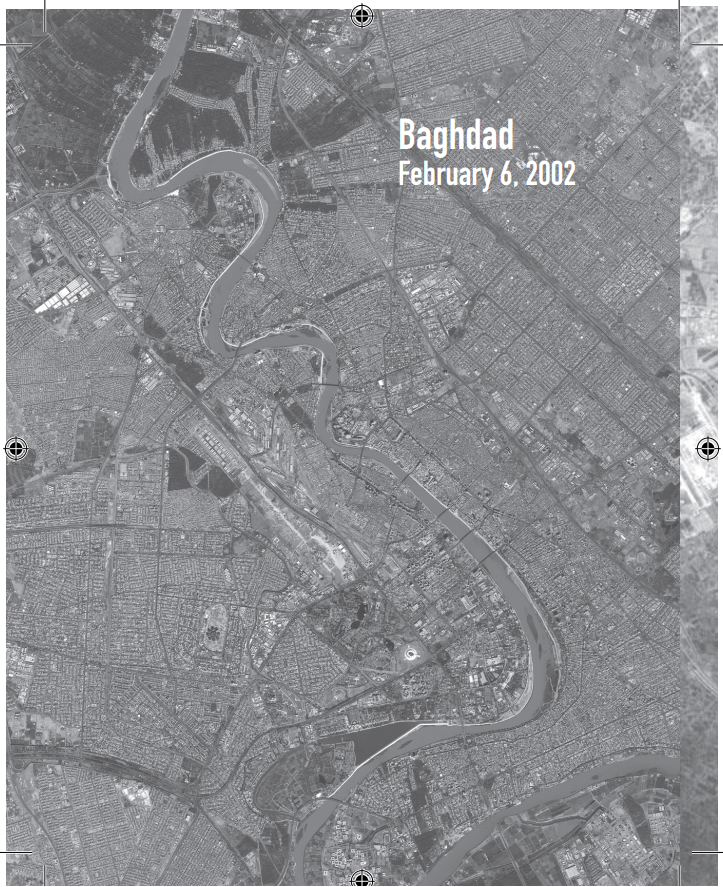
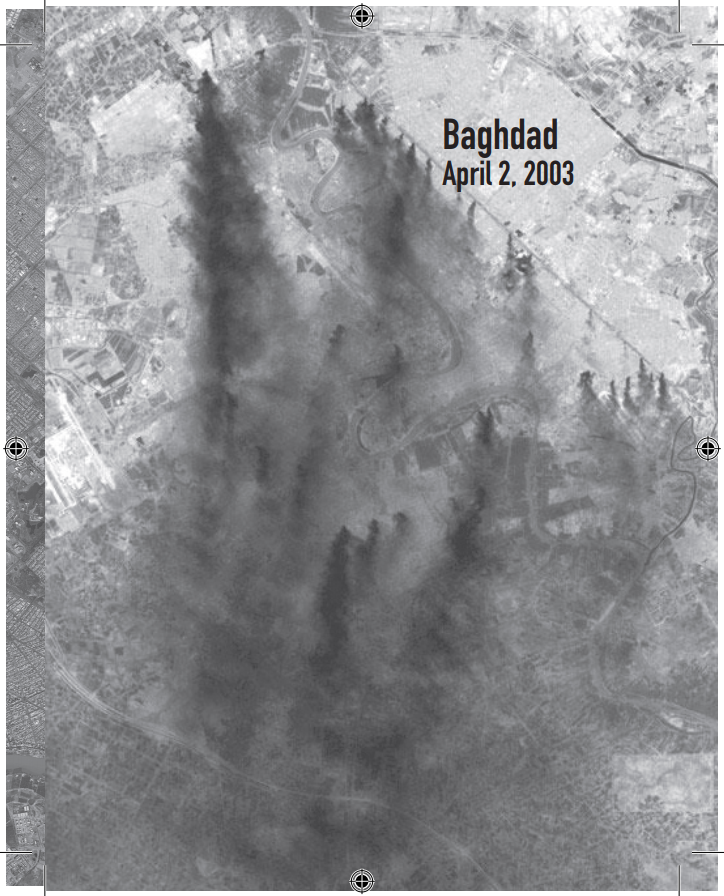
Foreword
I translated the articles published here as a step toward overcoming the lack of a revolutionary analysis of the resistance in Iraq against the occupation. Much has been written about the reasons for the invasion, the methods used in this attack and the excesses imposed on the Iraqi people. But what little is written about the resistance usually either accepts the mass media portrayal or falls into third-worldist cheer leading.
There are reasons for this that go beyond mental laziness. It is, in fact, quite difficult to get accurate, detailed information about what is going on in Iraq. Like a good and faithful servant, the mass media follows the line of the ruling class, carefully portraying only those acts of resistance that can fit into the latest official line. And this line has gone through several changes.
But those willing to look more deeply will see a picture of greater complexity. Although Islamist and nationalist groups have been channeling many aspects of the resistance into a form less threatening to the rulers of this world, there are also significant aspects that escape this channeling and reflect a class basis, even if this is largely unconscious. This is what is interesting from a revolutionary perspective.
The articles printed here were selected from the Italian language book Fuoco alle Polveri,[1] published by the comrades of “NN” (an Italian anarchist publishing project) and “Porfido” (an Italian anti-state communist “center of documentation”). They present a class analysis of the resistance in Iraq that seems to reflect an anti-state communist perspective more than an anarchist one. This is particularly evident in the way the authors speak about class. What may cause the greatest misunderstanding among readers in the United States is the frequent use of the word “proletariat” and its relatives. This word is often wrongly associated exclusively with the industrial working class. The term refers to all who have been dispossessed of the capacity to create their lives on their own terms and are compelled to try and sell their time for a wage, turn to social welfare programs, or scrape by illegally on the margins (or more often a combination of these things) to get by. This is what the term means in these articles. Unfortunately, some of the mythology surrounding the proletariat that can be found in some Marxist thinking appears even in the writings published here. Thus, at one point we read about “the fatal contradiction of capitalism: the proletariat in struggle.” While class struggle will certainly be the basis of any revolutionary transformation, it will only be so as the collective struggle of individuals against class relationships as such, and therefore against their own existence as proletarians. Only then does the struggle of the exploited become the fatal contradiction of capitalism.
In addition, the articles here are somewhat lacking in detail about the resistance. It is hard to tell what level of self-organization exists within the current struggles. Particularly notable is the omission of any mention of the organized activities of unemployed people that have happened since the occupation. Yet these activities have been among the more significant manifestations of class struggle in the context of anti-occupation resistance.
But despite these flaws, this class analysis of the Iraqi resistance is a good reminder of the fact that “the defeat of the proletariat” of Iraq – of which some revolutionary theorists speak – is not a permanent condition. Whenever the exploited resign themselves to their exploitation, they are defeated. Whenever they begin to fight back, both individually and collectively, this opens the possibility of overturning this defeat. If the suppression of the Iraqi insurrection of 1991, the long years of UN-sanctioned embargo and ongoing bombing by the US have reduced the exploited of Iraq to the most extreme impoverishment and desperation, the rage provoked by the occupation is moving them to act. We don’t know to what extent various Islamist and nationalist rackets have brought this rebellion into line, but the rage is that of people who are sick and tired of suffering at the hands of any of the world’s rulers.
These articles were originally written between February and May of 2004. As I write this, it is now January 2005. The US continues to push the election farce in Iraq,[2] even though this supposed proof of freedom can only happen through the imposition of the highest level of police state control, due to the extent of the opposition. As of this writing, the official number of Us dead from the war is almost 1,400. The number of injuries, mental breakdowns and suicides among Us troops is increasing rapidly, but their resistance is still sporadic, mostly the activity of isolated individuals. Nonetheless, growing numbers of soldiers returning from Iraq take action to end their military service, sometimes in the most desperate ways, and as of December 2004, the Pentagon reports 5,500 desertions.
The resistance to the occupation and to the schemes of the self-proclaimed “liberators” of Iraq takes many forms, and parts of it have certainly succumbed to Islamist and nationalist control. these articles do not call for uncritical support of the Iraqi resistance. Rather they provide a tool for understanding and analyzing what is happening in Iraq so that we can develop a practice of resistance against the war here that reflects our revolutionary aspirations and dreams. After all, our own active resistance is the only real solidarity with what is best in the rebellion of the Iraqi exploited against the occupation forces.
Wolfi Landstreicher
January 24, 2005
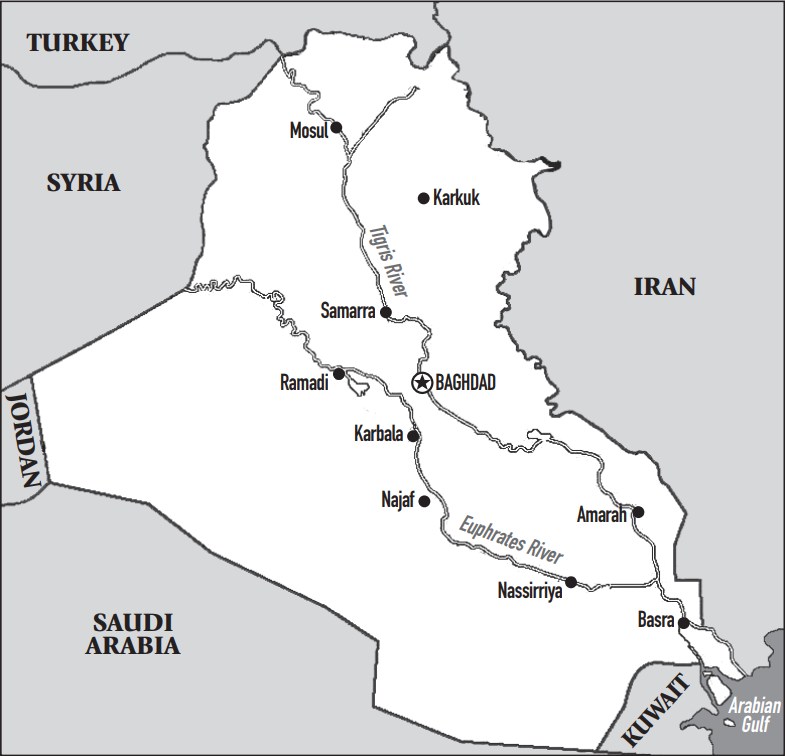
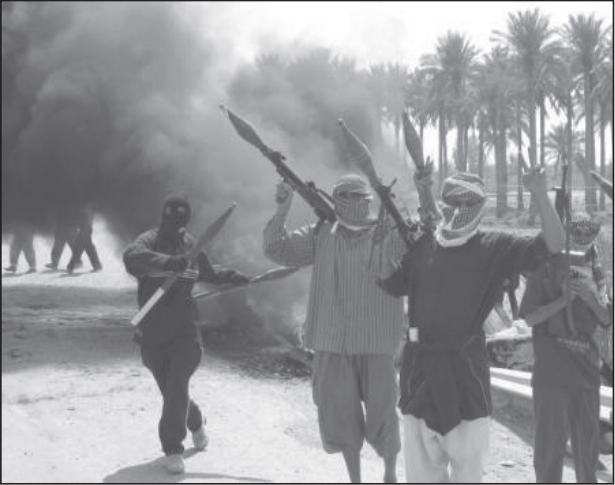
Introduction
This booklet speaks of Iraq in a different way than usual. State and economic reasons for the war are not listed here; the problem of oil in an economy that can’t do without it is not examined; movements and strategies of the occupation troops are not revealed. This booklet speaks of how the Iraqi proletariat has reacted and is reacting to the murderous plans of global domination. The texts collected here have no pretension of being a historical reconstruction of the events dealt with. They are intended as notes “in the heat of the moment” on the class conflict in the region that is going on today. These writings are composed close to the events as contingent “battle” interventions, and are thus certainly lacking from the point of view of completeness and structure. In short, this is not a book for specialists and scholars, but rather a tool for struggle for those who feel that they are involved.
It seemed urgent to us to investigate the social nature of the guerrilla struggle going on in Iraq against the troops of Western capital and against the tragic conditions that they have imposed on the local population for years with bombings, embargoes and repression.
At the same time, in order to better grasp the current situation, due to the general lack of information, it seemed important for us to recall the insurrection that broke out in Iraq in the spring of 1991, after the massacre carried out by the Western coalition in its crusade against the new Hitler, “Satan Hussein.” An insurrection comparable, by extension, to the Iranian revolution.[3] An insurrection that has no equal in modern history for the degree of repression and cover-up. In fact, nothing shows the indomitable spirit of the Iraqi people on the one hand, and the unfailing solidarity that unites all the forces of power and of the ruling class on the other, better than these events.
As the texts that we publish document, the Western states gave the dictator’s regime their full support so that it could crush that huge uprising in blood. It was precisely his republican Guard, with the blessing and support of the masters of the entire world, who used the much flaunted “weapons of mass destruction,” including deadly chemical gas, against the insurgents.
It was an authentic unknown insurrection, not mentioned by the servile press or falsified under the form of nationalist revolt. In reality, not only was it a general uprising – advanced by a wave of desertions that has very little precedent in recent history, and coordinated by self-organized structures (the shoras, or councils) – but its advance was repressed in the north of Iraq, precisely through the direct collaboration of the Kurdish nationalist parties.
It was the extreme difficulty of controlling such an explosion that pushed the Coalition to rearm Saddam Hussein’s hangmen and that advised the United states and its minions or rivals against directly occupying the region. The risk that Iraq would become the powder keg of the Middle East was greater than the certainty of exploiting its wealth. Only after more than ten years of embargo – costing at least a million deaths among the Iraqis – and after the brainwashing in the name of the “war on terrorism,” did the masters of the world decide to attempt the enterprise again.
But, as we said, the plans to reorganize Iraq are not as simple as they appear on paper. On the field there are always some variables that escape the cold calculations of military strategists and the staffs of multinationals. For example, there are human beings. In this sense, what does the behavior of the Iraqi exploited teach us?
At first, they ignored the appeals to resistance of the nationalist propaganda, refusing to be slaughtered in the defense of the foul fatherland against the invader and allowing Coalition troops to rid the country of the hated Ba’athist regime. Since then, they have used the energies conserved in this way to demonstrate to the Coalition armies, the new provisional government and its new forces of order, just how satisfied they still are with this much flaunted “liberation.”
This gratitude toward the “liberators” was made concrete through a trickle of actions of attack. Contrary to what the mass media tell us, the daily nature, spread and diversification of these actions show the predominantly social nature of the struggle that is going on. In fact, in evaluating this situation, we need to keep in mind that, due to “natural” media mechanisms and precise propaganda requirements, what the newspapers and television palm off on us are news stories about the most striking and brutal attacks, carried out by the organizations that are the most structured both militarily and ideologically. Meanwhile, hardly any news leaks out about the more spontaneous actions carried out in a kind of diffuse guerrilla struggle that, regardless of how much less organized it is, is still able to strike daily and cause a lot of trouble for the administration of the “new Iraqi democracy.”
Contrary to what the dominant propaganda proclaims, the military occupation of 2003 was so rapid because thousands of Iraqi soldiers deserted the army in mass, not at all willing to be killed for interests that were not their own. But once again, like in 1991, keeping their weapons.
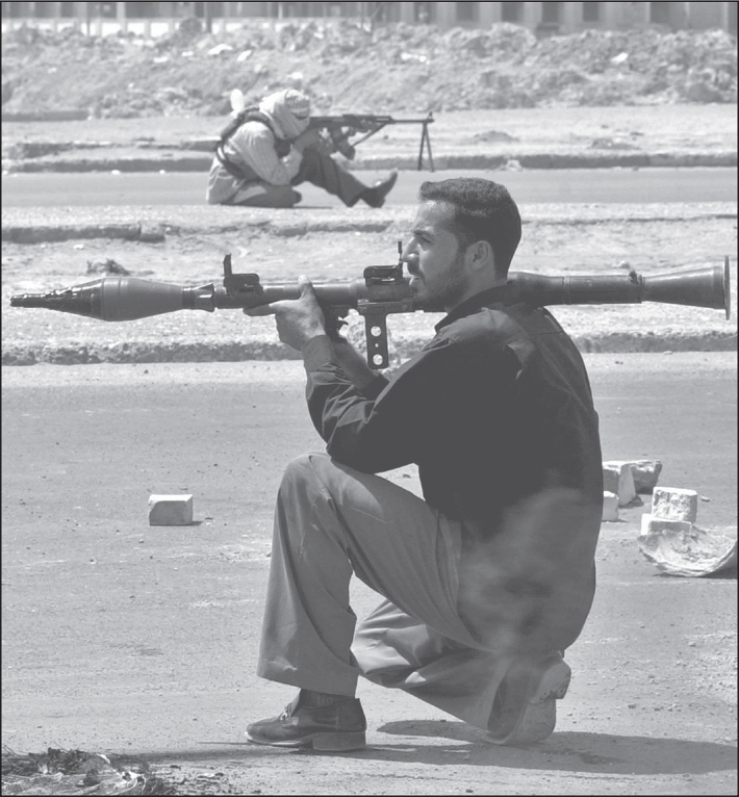
What no army could have done – i.e., making things difficult for the greatest military power in the world – a social guerrilla struggle is managing to do. From the attacks against military convoys to those against embassies and general headquarters, from the assaults against the new Iraqi police to the sabotage of pipelines and refineries, from the lynching of marines to mass strikes, now no one can swallow the lie of a population that loves the “liberating and peace-bringing” soldiers. No one who has a minimum of lucidity can believe that such an uprising could be solely the work of Islamic groups. To provide an example, during the looting that followed the collapse of the Ba’athist regime, causing damage to all that recalled the hated regime and its party, the Supreme Council of the Islamic Revolution unsuccessfully called for the return of the well-gotten gains to the new government. The office of the same Council was later attacked along with the other structures of domination: the armored lairs of occupation troops, the barracks of the new police. Recently a director of that organization, a big shot in the provisional government, was blown up together with his bodyguard.
The Iraqi exploited find themselves in extreme isolation, trapped between democratic slaughter and the fundamentalist racket. Within this situation, the Islamic forces, as tools of the owning class, have a good chance of increasing their power as the only organized force in a position to represent an “alternative” to Western imperialism. But the fact that this faction of the Arab bourgeoisie is seen as the only thing capable of opposing the American way of life, and the consequent robbery of the human and energy resources of that region, depends on the absence of a distinctly different, concrete perspective of an authentic and solidly internationalist class discourse.
And this depends on us. Iraqi proletarians are giving us an example of indomitable fighting spirit, as the Argentine, Bolivian, Algerian, Palestinian, Korean, etc., exploited have done in recent times. The horizon of these ample battles is inevitably linked to the struggles that the exploited of Europe and, especially, the United States will be able to build. In fact, as long as they remain isolated, these struggles will be able to do nothing but flow back into nationalist, religious or democratic dead-ends, or be struck down by a repression about which Western public opinion will, at most, read a paragraph in the newspaper.
The pulsing heart of the Economy resides here along with its war apparatus that allows the exploitation of resources and the repression of regions that are not responsive to “pacification.” Now more than ever, social revolution will be global or it will not be, not due to an abstract humanitarianism, but due to the global dimension reached by capitalist accumulation and thus by the portending social war for its destruction.
The logic of war, with its indiscriminate, and therefore terroristic, violence, exposes the populations of warmongering governments to terrible reprisals (as the bombs in Madrid show). It is no longer just a TV show.
There is only one way out of this spiral of death: showing in practice that the Western exploited are not allies of their masters, but rather accomplices of their Iraqi brothers and sisters who the bombings and repression have not managed to crush. The Iraqi situation shows that capitalism drips blood, but that it is not invincible. Here is a lesson to learn in the struggle against the enemies at home. Let’s leave the perfunctory tears for the lives of mercenaries in the pay of capitalists, tears never shed for all the dead Iraqis, to the nationalists. Let’s leave the façade of pacifism that calls on the UN, one of the main entities responsible for the Iraqi slaughter, to hypocrites. Let’s leave the call for national liberation struggles, which have always been deceptions of rising masters and tools of a new oppression, to backward Stalinists. What is going on in Baghdad, Bassora and Nassiriyya has various forms and languages as well as huge obstacles, but it has an old name: class struggle. We don’t know what degree of autonomy the exploited have in relation to the various forces of the ruling class. And we are equally ignorant of what organizational structures they have given themselves in their resistance. The repeated strikes of oil workers, hushed up by the propaganda machine, would suggest a capacity for class offensive as a background for the guerrilla war itself.
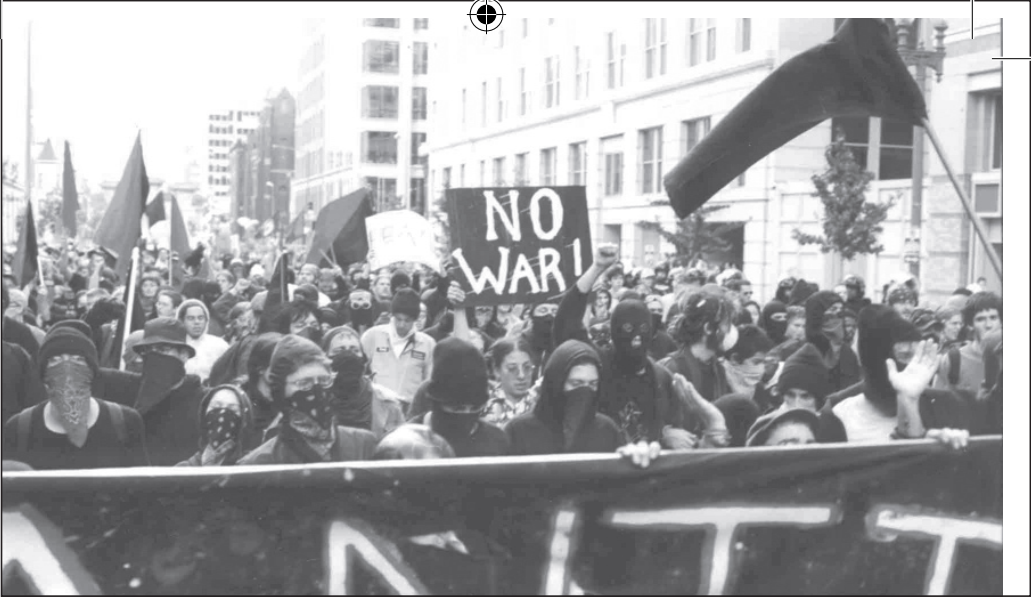
The texts that follow bring together some of the few contributions published with such a slant. Unfortunately, many revolutionaries have flung themselves, whether more carelessly or more deeply, into great geo-political or diplomatic-military interpretations of the rivalries between the oil companies or the various state gangs, without posing the only question that truly counts in a subversive perspective: how are the Iraqi exploited reacting? There is little information, and this already says a lot about the effectiveness of the internationalism that exists today, even in the most modest sense of a few significant contacts. The extreme distribution and diversification in the practices of attack and guerrilla struggle suggest their social and class nature.
Beyond the beatific vision that hopes for global revolution and its redemptive spontaneity, various accounts of the insurrection of 1991 show that uprisings are the encounter between the action of a rebellious minority and a specific social situation coming through many mysterious paths. The relationship between the armed attacks of small groups, the general uprising and the birth of the shoras, in Sulaimaniyya for example, offer more than a suggestion in this sense.
Contrary to the claims of the naïve and of party hacks, solidarity toward the social guerrilla struggle in Iraq is certainly not subordinate to the presence there of some grouplet of this or that tendency with which militants here should identify. Let’s leave that to those who are more interested in advertising their political wares than in developing the collective movement of individual liberation from which a different life could arise on the ruins of every power structure.
If it is up to the exploited of other countries to rescue the Iraqi guerrilla struggle from the grip of fundamentalist and pan-Arabist rackets, to bring it out from the terrible isolation in which the ruling order and its organs of falsification are confining it, then a specific responsibility falls back on revolutionaries who live in the states directly involved in the Iraqi slaughterhouse. There can be no doubt about the brutal repression the Iraqi exploited are subjected to, from reprisal to searches, from hunger to the torture of prisoners. Even the enslaved press recently revealed the rapes against many prisoners committed by allied soldiers and the new Iraqi police acting together. The guerrilla struggle responded to a desperate appeal by some of the prisoners, which called for an end to this violence by any means, with a desperate attack against the prison during which, unfortunately, many prisoners also died. The images of the tortures have gone around the world, thanks to the conflicting interests of various capitalist factions and their related press agencies. What none of the journalists say, however, is that this is the norm of every army in the world, and that torture is practiced, to varying degrees, in police stations at every latitude.
If it is important to unmask the exterminations and foul deeds that the United States has committed in the exportation of its democracy, we should not forget the masters of our home, those who slaughter in our name.
This booklet is a modest contribution to be discussed, improved upon and, above all, used practically.
May 2004
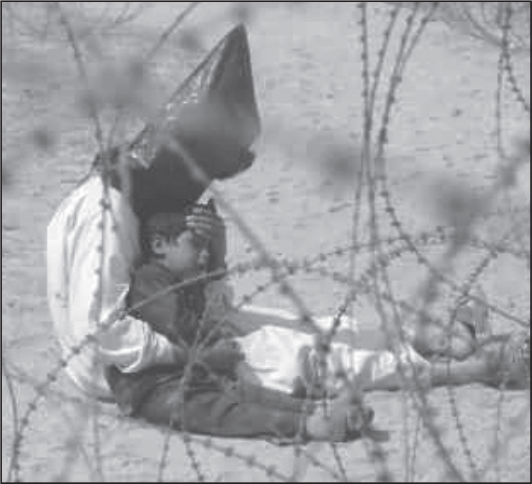
To the Irregulars of the Civil War
August 21, 2003. Almost simultaneously, the UN office in Baghdad was devastated by an attack with a truck-bomb and a bus exploded in Jerusalem. There is no direct link between these two events, and yet it is difficult not to think of them together. … If these terrible explosions truly have a common origin, it is made of lucidity and desperation. Against this mixture the deluge of fire and money that has fallen on Iraq is powerless. The armored vehicles, the selective executions, the construction of a prison as large as a people and the Israeli lies are powerless. That the resistance often takes the form of suicide attacks against civilians, that it is essentially carried out by religious movements, certainly, all this can only sadden us, but what are others waiting for … to invent new forms of action?
—Eric Hazan, Chronicles of Civil WarA great calm currently reigns here. Everything is quiet, as if enveloped in snow on a winter night. Only a mysterious and monotonous sound like spattering drops. It is the unearned income of capital that falls into the cashboxes of the capitalists nearly causing them to overflow. The continuous increase of the wealth of the rich is distinctly hated. Occasionally this muffled roar is mixed with a sob emitted in a low voice, the sob of indigence. Sometimes a light metallic sound echoes like that of a knife being sharpened.
—Heinrich Heine, September 17, 1842
The Iraqi powder keg is placed within a context of global civil war. But what does “civil war” mean?
Despite the powerful cover-up carried out by the technological and media apparatus, the present planetary order is arranging social relationships along increasingly brutal lines of force. Human relationships implode under economic and bureaucratic burdens, obliterating the very foundations of all individual and social autonomy. Supposedly universal values miserably collapse. The legal sham is unmasked by the ceaseless military and police aggression that no longer hides behind the fig leaf of legality. International law is nothing but the rotten order imposed by the most powerful gangsters. Before a business mafia that extends across systems and borders, the old and false national ties come apart. In such conditions of uprooting and fear, only two ways out openly present themselves: the emergence of technologically equipped fundamentalism, or the social storm of class conflict.
We are going through a time that is, in every sense, filled with possibilities. Listening to its sounds, one doesn’t just hear the dry sound of boots or the muffled sound of slippers. Taking Heine’s image up again, a subterranean weapons mill is sharpening the knives of liberation.
If we look carefully, we will catch sight of an increasingly obvious thread that links the social explosions of Iraq, Palestine and Algeria to the movement of – ideological and police – troops in our neighborhoods. The operations of urban reorganization and repression give out an odor of fear in the face of the conditions that domination itself has brought together. Furthermore, the conflict penetrates into individual sensibilities themselves, which the old collective identities (work, the family, cultural affiliation) are no longer able to hold together. At the first jolt, a deep sense of uncertainty pervades people’s minds, opening them once again to opposing possibilities: fear of oneself and others, but also a new emotional disposition allowing one to be involved with what is common. The liberal model of the self-assured businessman, imposed by city planning through the privatization of living spaces, sours in the daily lives of weak and defenseless human beings. Rational calculation is thought to govern everything, as the ruling order is believed to control the contradictions it generates. but nervous tics admit what the outward smiles ever more clumsily try to hide.
What space is the social struggle, from Los Angeles to Gaza, from Quito to Bassora, opening in the global civil war?
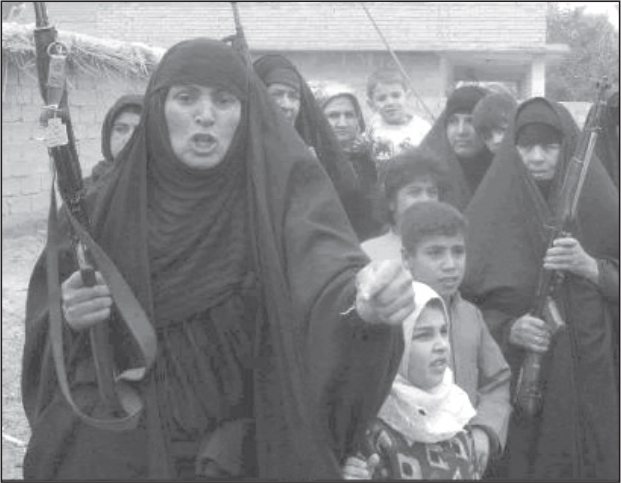
If anything marks the events in Iraq, illuminating at a single blow the fabric of social relationships, it is that no one – neither capital, nor Islamism, nor revolutionaries – knows how to govern the arranging, aligning and dispersing of the forces in the field. The quantitative model of strength – army against army, front against front – is literally falling to pieces together with the plans of the world’s masters for military occupation. The spectacle of muscles of steel is shattered by the flames of revolt through mysterious conspiracies of events – a deadly jungle for the occupiers – triggered by a resistance with causes and reasons that are not at all mysterious.
The understanding of the relationships of force has never been so decisive for the ruling order and for its most relentless enemies. This understanding reflects the rules of subversive play with its improvised unions and its equally sudden separations.
Pedantic geopolitical analyses have very little to tell us. In these times, the metropolitan police are shown to us as equal to advertising, guerrilla wars as equal to family conflicts. What happens at the “periphery” is reflected at the center and vice versa. In this sense, the Iraqi insurgents are giving us a hand, weakening the global ruling order to which we are all subjected. If, after September 11, the United States conceived a gigantic plan for crushing the lands of Afghanistan, Iraq, Syria and Saudi Arabia under their tank tracks, the flames of Bassora, Nassiriyya and other places are stopping the murderous aims of the greatest military power on earth. Wouldn’t now be the time for the irregulars of the Western civil war to feed these flames?
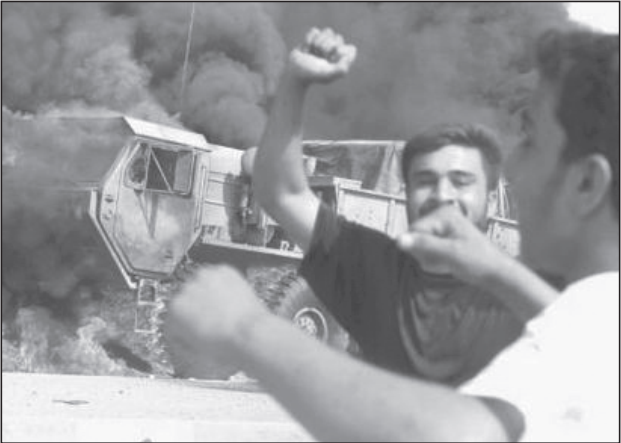
If the fairy tale of rights is laid bare by the brutality and torture transmitted in global vision, pacifism seems equally absurd as it demands respect for legality and confines opposition to the war within the single public-advertising space of the plaza, i.e. far from the gears of the capitalist extermination machine. And yet, as the wildcat strikes of the transit drivers in Italy and other workers showed in an exemplary way, jamming this machine, blocking the movement of its troops, is possible.
The old internationalist slogan, “Carry the war into the cities,” has up to now been put into practice not by revolutionaries through the attack on the common enemies of the exploited, but solely by the enemies of every common attack by the exploited: through the indiscriminate bombs of Madrid. The concept that “Western equals imperialist” is spreading in a terrible way among the damned of the Earth, desperately alone in their resistance. This is why, in the face of democratic massacres, a historically secular region like Iraq becomes favorable terrain for the “community” of militant Islam, a false realization of the real need for solidarity and liberation. It is certainly not with appeals to tolerance and lessons in civic education that this equation will be shattered, but rather by bringing the social war here.
The same people who repeat that “the state of exception in which we live has become the rule” – quoting Walter Benjamin unsparingly – then exchange the practice of direct action, which doesn’t give a damn for the law, with the demand for illusory rights. In a movement that brings more and more pieces of Palestine into our cities, capital and the rebellions that it encounters will explain what Benjamin meant when he spoke, in times quite similar to our own, of revolutionary violence as “the effective state of exception” as opposed to the “fictitious” one of rights, fully laid out by fascism.
This gap between the rhetoric of flyers and the impotence of practice – as if we ourselves were the first ones not to take what we say seriously – is demonstrated quite well by the blackmail that the movement manages to swallow so stoically. As soon as it takes any step forward, it immediately goes back on the defensive. The state propaganda after September 11 caused the revolt of Genoa to be forgotten. The criminalization of Iraqi resistance is causing us to forget that the opposition to the war that caused millions to go into the streets is precisely what the insurgents in Iraq are now laying out on the field. As one of the texts that we publish here says, the mass media can make people move when it is a question of protesting against the horrors of that which subjugates them, but it immobilizes them when it is a question of coming to the aid of what could liberate them.
In the pages that follow, we speak about the Iraqi revolt as “social guerrilla war.” With this term, we want to emphasize that the resistance to the occupation and its second-hand governors has not yet reached the dimension of a full-fledged insurrection, but has already leapt beyond the mere guerrilla activity of nationalist and Islamic groups. The workers who strike are themselves forced to use arms in such a context. We believe that the texts collected here give an account of this approximate definition.
The cards are rapidly shuffled; the forces of times and countries apparently so distant intersect in constellations of events that are at the same time promising and terrible. Freedom needs the storm, but in the storm it is difficult to maintain the sense of the life for which we fight. In Iraq today an important piece of this battle is in play.
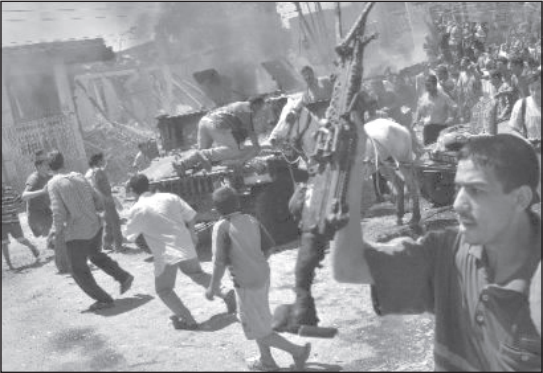
Bassora, Nassiriyya, and Other Places
(This is a reworking of the article “A Few Considerations about the Events that Currently Shake Iraq” by the International Communist Group from their publication, Communisme, #55, February 2004.)
Despite the amnesia that they would like to impose on us, we can’t forget that the Near and Middle East have constituted a veritable social powder keg for decades. This region has been shaken regularly by impressive disorders, and the interventions of the world’s masters here have always aimed at stabilizing it. Without going too far back in time, we can distinguish a cycle of struggles that developed in the 1970s and reached its peak in 1979 – with the generalized proletarian uprising that in Iran was able to sweep away the world’s fourth largest army, the shah and his infamous secret service in a single blow. Containing this struggle wearied the ruling class. It had turned to various pretenders who laid claim to the throne. But in order to break and crush this powerful movement, it had to appeal to a radical faction of social democracy, dressed in the colors of the ayatollah’s turbans. Iraq unleashed a war supported by all the ruling classes of the planet – from the USSR to France to the USA to Israel. This war accomplished the job, by supporting the ayatollahs in their shameful counterrevolutionary task of regimenting local proletarians through the defense of the fatherland, Islamism or pan-Arabism. Very briefly, this is how the masters of the entire world have united, without exception, to confront the only nightmare that has never ceased to obsess them: social revolution, the destruction of their system of death.
On these occasions – like in the days immediately after the Paris insurrection of 1871 or the Russian insurrection of October 1917 – we can speak of the materialization of a process that generates a veritable global state of capital, which regroups all the capitalist factions in defense of the general interests of the system and its reproduction on ever-expanding bases, concentrating on a point of gravity for bringing together the already existing state structures. When social revolution pounds on history’s door with all its might, the gangs of exploiters choose to forget their immediate interests, for a time, of course, and rally behind the faction that is most capable and well-equipped for defending capitalism. The global state is precisely this process in motion, always in gestation, that breaks up and establishes itself increasingly more powerfully, expressing the organization of capital in a dominating force, in the force of exploitation that has a greater and greater need to impose its social order in every part of the world, monopolizing violence and keeping it in the hands of the ruling class. The greatest worry of capital’s global state is that the permanent catastrophe that it generates will unfailingly provoke violent, armed, uncontrolled reactions … that it must continually attempt to smother in order to maintain its rule. The difficulty of reasoning in terms of individual countries in such situations is clear, because the reality of this process often surpasses the commonly acknowledged division between states. Today, in the heart of state structures of the US (the state department, the Pentagon, the CIA, etc.), the established faction is determined to play the role of global police. Even those that are in competition with this faction support the United States’ role as global enforcer.
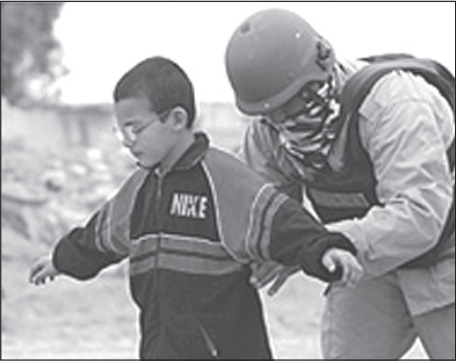
Despite the existence of two blocs during the Iran-Iraq war, the entire ruling class on the planet, even those who were then declared enemies, temporarily put aside their differences in order to confront proletarians who had just brought down one of the most powerful governments in the world, that of the Shah. The nameless butchery of that war, reminiscent in various aspects to the human slaughterhouse of 1914- 1918, lasted a full ten years. Desertions, refusals to fight, strikes and rebellions spread like a social epidemic that spurred the exploited in uniform to unite and fraternize in order to confront the two armies as happened in the swamps around the Fao peninsula, in the vicinity of Bassora, and on the mountains of northeast Iraq in the region of Halabja. At the height of the proletariat’s refusal to sacrifice themselves for a cause that had never been their own came the response of power. Repression, arrests, shootings, kidnappings and chemical bombings: this is what the moribund epoch offered to those who no longer wanted to submit to its human-eating needs.
This situation couldn’t last forever. Peace between the belligerents was necessary in order to pacify the exploited on both sides of the border, but from then on the epicenter of the discontent would move from Iran toward Iraq. Here, Saddam Hussein’s regime had difficulty containing the growing rage against sacrifices that the despicable homeland had claimed from the blood-drained proletariat for more than a decade. The solution for keeping this rage outside of the sphere of social conflict was found quickly. Misdirecting the excess of anger and misery toward one of the nearby rich countries allowed the miserable to sate their hatred against the masters and their war by participating as mercenaries in looting wealthy Kuwait. The result is well-known. The Iraqi invasion of the emirate with the blessing of the United States, which was prepared at the same time to bring the proletariat back into line, led to the assembly of the most formidable coalition since the second World War. This was the price to pay for the restoration of order in that region. The number one aim was to put an end, once and for all, to all those who challenged the authority of the exploiters with arms one time too many. The second aim was to get rid of Saddam Hussein and his supporters, who were incapable of fully taking on this role. Even though it had 500,000 soldiers armed to the teeth and a gigantic naval and air armada, the Coalition was not able to take possession of Baghdad. Once again, the proletarians returned to their path and turned their weapons against their officers. Bassora, Baghdad, Sulaimaniyya and other cities rose up, giving birth to the organs of self-organization called shoras (councils), blocking all the dreams of power at a single blow and temporarily screwing up the plans of the warmongers. Incapable of doing it on its own, the Coalition left the dirty work of suppressing this generalized insurrection to Kurdish nationalist politicians in the north and to Saddam Hussein in the rest of Iraq. the republican Guard, which had been miraculously spared by the aerial bombing, massacred the insurgents under the attentive eye of the Coalition.
In the history of social struggles, neither chance nor miracles exist. If the airplanes of the Coalition didn’t turn their tons of murderous bombs on this corps, specialized in the maintenance of social order, it was because it could still be useful for some tasks in this or that situation. The generalized insurrection was such a case. This situation was certainly anticipated by global domination in its various plans. Who says our enemies are stupid? Unfortunately for us, they know their interests and often happen to reason in class terms. In the face of this insurrection, they had no choice but to leave Saddam Hussein in government and postpone the bloody plans for conquest established by the Pentagon and the UN.
The exploited would have to pay quite dearly for daring to take up arms and for preventing the most determined faction of the world’s masters in the guise of the Coalition from restoring order in Iraq. After a million deaths in the Iran-Iraq war and another million deaths due to war, aerial bombing and repression of 1991, the next ten years were not any gentler for the Iraqi population. A gigantic embargo, decreed by that gang of marauders that is the UN, brought a slow death to thousands of children. In total, another million corpses have entered the cemeteries. Along with this embargo, the military bombing, carried out under the cover of humanitarian aid, did not stop. day after day, the embargo was aggravated by Coalition air strikes that from 1991 on dropped nearly as many bombs on Iraq as the allies dropped on Germany during the second World War. This allowed Saddam Hussein and his gang to consolidate their stranglehold on the exploited, who could only eat what the Iraqi government, with the aid of the UN bastards, distributed as rations (the black market was completely inaccessible). Hunger is a terrible weapon in the hands of the powerful and has been used in order to destroy and subjugate the struggling proletarians of this region. In the north of the country, where Kurdish nationalists and Islamists helped crush the rebels, a policy that called for the handover of weapons in exchange for food was systematically organized with the blessing of the UN, the US and all the non-governmental organizations present. This forced the exploited to choose between giving up the gun to eat, as the humanitarians and supporters of human rights cunningly advised them, or taking possession of what they needed for themselves and their children.
After having starved and bombed the exploited for years, without much outcry in the mass media, in the days after September 11, 2001, the strategists of the Pentagon declared that the moment had come to put an end to this abscess. In the wake of the invasion of Afghanistan, a new invasion was planned. The arrogance of those who now consider themselves masters of the world is so incredible that the American Secretary of War, Donald Rumsfeld, announced that a tenth of the earlier Coalition would be enough to march into Baghdad in the course of a few weeks. Being more prudent, the military brass of the Pentagon immediately sent 200,000 men and women. The current Coalition is effectively not as broad as that of 1991, but behind the farce of the Chirac-Schröeder duo and their henchman, Putin, every capitalist faction on the planet is concretely associated with sheriff bush in the main objective of this mission: bringing order to the region. No one has held back in this war, and not one among those who so loudly proclaimed their opposition has done anything serious to prevent it. The French state has granted the American military permission to travel through its airspace with B-52 flying fortresses that depart from bases in Great Britain to go drop their tons of bombs on Iraqi cities (preferably on working class neighborhoods). While loudly proclaiming its pacifist intentions to the great public, the German state forked out millions of Euros on the sly in order to support the police mission carried out by the Coalition troops. This balancing act has allowed the social democratic chancellor Schröeder to win the legislative election along with his environmentalist allies by riding the pacifist wave that flooded into Europe at the time, and simultaneously, along with the rest of the European Union, to send two hundred and thirty million dollars to Iraq under the pretext of humanitarian aid. For his part, Putin has received authorization from the global police to reestablish order in Chechnya in exchange for his diplomatic and much more discrete military aid in this second version of the Gulf War. Finally, the spectacle against the war would not be complete without the staging of repeated votes in the UN and the media stances of its General secretary Kofi Annan. While the UN published its resolutions, he prepared the invasion of Iraq that the Pentagon planned by collecting ultra-confidential information under the cover of humanitarian aid. This espionage, that agents of the UN who were in the area carried out directly within the framework of the policy of aid to the civilian population and transmitted directly to the CIA, is now nothing but a buffoon’s secret.
Sidebar: Question of Style
For those who espouse the pacifism that invokes the role of diplomacy, international law and the UN to “resolve” the Iraqi quagmire, Hassan Fattah, director of the Iraqi newspaper Iraq Today, gives a good explanation of what the role of the UN might be and why it might want to replace the much too bloodthirsty US army: “In fact, nothing could be more harmful than the sight of American tanks and soldiers invading the cities and urban areas as they have done in the last several months and will probably continue to do. The American troops are adapted to combat, not ensuring the peace. ... It is necessary instead to teach soldiers to use non-lethal arms. Tear-gas and fire hoses, commonly used by police forces to confront riots, should be used more often wherever it is necessary. This would reduce the number of images that appear almost daily of Iraqis under fire from the American armed forces. And this could emphasize a reduction of the climate of violence. One of the main reasons why tear gas tends not to be used is that, in war times, the Geneva convention classifies it among the chemical weapons. If the United States would give way to the Blue Berets of the UN, the security forces would have more freedom of action to operate as a true police force that aims to guarantee the maintenance of order...”
This second intervention is not just a moment in the generalized war between various capitalists clashing over control of the world and trying to eliminate their adversaries in a mad race. It recalls all too well the police operations so common in the city of Sao Paolo, where proletarian youth who live on the streets are labeled delinquents so that death squads financed by the rich shopkeepers can kill them more easily. Like the police force of Rio de Janeiro, the American soldiers are called to restore order at a higher level in a region where social instability has become too pervasive. So, beyond the various approaches on how to proceed, this is the objective the global state sets itself. Some, sure of their own strength, have gone to Iraq without obligations linked to UN resolutions. Others have preferred to go there under the blue flag of humanitarianism and human rights, hoping in this way to avoid the rising of a guerrilla war that would destabilize the entire region, and risk provoking social upheaval throughout the whole world if victorious. This is why Chirac and Schröeder, Putin and Annan ended up supporting Bush’s team.
The fact remains that this time the soldiers were not mistaken for humanitarians. The police operation had been carried out resolutely. The first four weeks of conflict[4] were a real pushover despite the obstacles encountered and the 55,000 civilians killed – disgracefully described as “collateral damage.” the orders from on high were clear: shoot anything that moves, ask questions later.
The Iraqi army and its special forces immediately disappeared from the battlefield, allowing Coalition troops a free passage for entering Baghdad. The relative ease with which the invasion troops passed through the entire land, from south to north, with almost no hindrance proves only one thing: that Iraqi proletarians, mobilized, conscripted, trained in the barracks and sent to the front to sacrifice their lives on the altar of the fatherland, refused to do so. Just as they did during the Iraq-Iran war of the 1980s and the first Gulf War, once again the Iraqi exploited gave an example to their brothers and sisters throughout the world by refusing to fight for their oppressors. This admirable attitude has not been taken into consideration in any of the texts we have had the opportunity to read about the events. This small detail says much more about the proletarians’ state of mind at that moment. This is why Saddam Hussein lost the war: not due to the real or alleged treachery of his supporters and accomplices, but simply because the cannon fodder, which is normally so docile, refused to fight and die for the interests of others. Entire units of the army dissolved themselves in a few minutes on the roadside, deserting, abandoning uniforms, officers, boots, vehicles and armored cars to go back among the civilian population – but keeping their weapons. So proletarians deserted and returned home, armed, waiting to see what would happen.
A second interesting occurrence – still keeping away from the military and political mishaps that are completely secondary and of no interest within the scope of this analysis – has undoubtedly been the manner in which the Iraqi exploited have welcomed those who have pompously proclaimed themselves “liberators of the new Iraq”. There was not the great explosion of joy that Europe saw during the passage of allied forces after the retreat of the German troops in 1945. Despite the brainwashing done to American soldiers, the “liberators” have found very little jubilation at their arrival. The proletarians of the region have greeted them with a great deal of suspicion, still recalling clearly that those who came to “liberate them” supported Saddam Hussein for decades and that in 1991, after encouraging them to rise up against Saddam, these “liberators” left them to be slaughtered by this dictator’s repressive forces. As soon as the invasion troops got rid of the last pockets of resistance, the proletarians flooded the streets in the hundreds of thousands, not to cheer their “liberators,” but to loot everything that closely or distantly represented the detested power of the Ba’ath party and Saddam Hussein.
The damned of the earth didn’t stop halfway on this good path: everything was looted, from the presidential palace to the barracks, from the ministries on up to the residences in the rich neighborhoods and even mosques. As proof of this we take a widely distributed appeal from the supreme Council of the Islamic revolution, a group which brings together most of the imams, that requested “humbly to the faithful to bring back everything that had been taken.” The imams described these events as “a moment of confusion” on the part of the faithful. These merchants of ideological opium have forgotten that in 1991 the insurgents of Najaf and Karbala pissed on the sanctums that they insist on calling “holy places.” this shows all the consideration that the enraged exploited have for such merchants of artificial paradises. Despite the scarcity of information that filters from this region, it can be confirmed that very few of the looted objects have been returned, a further demonstration of the current limits of the authority that Islamists exercise over the proletariat in Iraq.
Sidebar: The Ba’ath
The Ba’ath (Socialist Party of the Arab Revolution) was born in 1953 from the fusion of Al-Baas Al-Arabi (Arab Resurrection) and the Arab Socialist Party. Set within the pan-Arab nationalist current of the 1950s-’60s, the Ba’ath maintained that the Arab people formed a single nation with the “historic mission” of coming together in a socialist state free of any foreign domination. As an inescapable consequence of such mystifying ideological discourse and the related practice, the Ba’ath was behind many coup d’etats (particularly in Syria and Iraq) and, starting in 1963, furnished indispensable aid to the Palestinian nationalists of Al Fatah for building a Palestinian state. As the power in Syria and Iraq, thanks to its “social” reforms, the Ba’ath became the most faithful servants of capitalist interests in the region, making proletarians suffer the consequences of the Ba’ath’s role as the guard dogs of wage slavery and state despotism.
The occupation troops allowed this looting to happen, clearly hoping that the rage of the exploited would calm down. In general, the only things that they defended from looting were the Ministry of Oil and everything linked to it: oil wells, pipelines, refineries, platforms, storage depots, oil transporting trucks, etc. The faction grouped around bush has undertaken the dirty work on behalf of capital in its totality, but certainly has not forgotten its own particular interests linked to oil and armaments. this has annoyed many of his rivals, who continually remind the presidential team of their interests. This is the sole point of discord between the masters of Halliburton, British Petroleum, Total-Elf-Fina, Russia and China (which had reached an exclusive agreement on the exploitation of the Iraqi subsoil before the war). behind the mask of respect for private property, the rights of the people and other legal fabrications, Chirac and his gang reminded the occupying troops that they could not allow the exploited to unleash their rage against the rich and their property with impunity. Something similar to order was restored with machine-gun fire. When this wasn’t enough, cannon fire reminded people that occupation troops were now the masters of the country. But in their arrogance, the American governors have not established effective means of control over a situation that slipped from their hands within a few days of the conquest of Baghdad. Excited by such an easy victory, Donald Rumsfeld dissolved not only the Ba’ath party and Saddam Hussein’s government, but also the Iraqi army and police, despite the fact that this action went against the opinion of many specialists in social pacification, such as Bernard Kouchner, who is ready to “support the Americans” and “put himself at the service of the free Iraq.” In this way, Rumsfeld provoked a great deal of chaos, while looting and the occupation of institutional buildings by hundreds of families with no money continued to spread. For the good of the Western conscience, which had believed the occupiers’ official speeches about the “new Iraq,” “the end of the dictatorship,” “democracy,” etc., the disappointment has been enormous.
Sure of an easy victory and with such a colossal strike force, American troops could not have imagined that anyone would try to raise their head. To the Pentagon, the problems caused by looting and chaos were thought of as secondary phenomena that would quickly be brought back into line, as soon as the American army decided to put an end to them. This is also why post-war policy was not planned by the strategists that determined the invasion. They thought that after the trouncing Saddam Hussein’s army received, everyone would submit in silence. However, these strategists did not consider the proletarians’ refusal to be used. In the summer, demonstrations quickly changed into revolts throughout the region. In Bassora, on August 10 and 11, 2003, a crowd, exasperated by the new yoke of oppression and a situation of misery that kept on growing, slaughtered several British soldiers. Similar causes produced similar effects. Thousands of proletarians have gone into the streets in Fallujah, Ramadi, Mosul, etc., demanding that the occupying forces restore electricity, water, roads and food. In short, everything that is necessary for survival after a war. The response of the Coalition “liberators” has been arrogance, arrests and the use of automatic weapon fire to disperse rebels, even though a few of the more shrewd regional commanders have gone to work in order to get a minimal infrastructure back on its feet. The occupation troops have admitted to imprisoning more than 10,000 people for “disturbance of the civil order.” And circumstances are not at all calming down. Since the start of 2004, increasing numbers of unemployed people have organized themselves to demonstrate throughout the country. Thus, during the weekend of January 10-11, 2004, thousands of proletarians in Amarah demonstrated to demand better living conditions and transformed their march into a riot, taking it out against those responsible for their miserable situation: city hall and the general headquarters of the British 1st Light Infantry Battalion. The Iraqi police and the English troops shot into the crowd indiscriminately. The balance was heavy: at least six dead and dozens wounded.
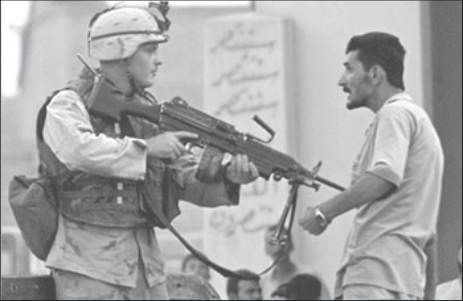
If the official propaganda of the “new Iraq” maintains that all the adversity and harm that Iraqis suffered were due to the greed of Saddam’s regime, today the reality that all the exploited in the region experience is worse than it was under the Ba’athist dictatorship. Often there is no food, despite the enormous flood of goods that overflows onto the pavement of big cities since the borders were reopened to trade. Work and wages are non-existent, increasing the poverty in which the majority of the population has been living for decades. Officially, the unemployment rate has reached seventy percent of the active population. The dissolution of the army has accelerated impoverishment, interrupting the income of thousands of families. The destruction of the infrastructure and privatization also push an ever growing number of workers into unemployment and poverty. It is, therefore, not surprising that many Iraqis take up arms against Coalition troops and engage in guerrilla warfare or large-scale theft in order to survive. Sabotage of pipelines and refineries, assaults on convoys, and attacks against soldiers have spread rapidly, leading to reprisals that American troops carry out with escalating violence and arrogance. In turn, this situation has provoked the refusal of proletarians to meekly let themselves be called back to order.
Not a day goes by without the announcement of an American soldier blown up on a mine or caught in an ambush. The same goes for Iraqi police of the “new Iraq,” who often see their buildings targeted, preferably on pay days when they can all be found together. But if the objective here is perfectly understandable, the same goes for other attacks against those things from near or far that may contribute to forcing the proletarians of the region into line. One of the first attacks was against the Jordanian embassy on August 7. It was later revealed that Jordan participated in the stabilization effort by training 30,000 new Iraqi police, with the discrete aid of the French secret service. It is no surprise then that these buildings were targeted for attack. On August 19, the UN general headquarters was targeted, and the mission chief, Sergio Vieira de Mello, and most of his collaborators were killed. Is it necessary to remind ourselves of the proletarians’ hatred for this global institution that organized the famine all these years and is now participating with all its force in the establishment of order in Iraq? Ten days later, it was the turn of the director of the supreme Council of the Islamic revolution in Iraq, Ayatollah Al Hakim, to die in an attack in Najaf. On September 2, a new attack against the general headquarters of the Baghdad police damaged the office of the police chief, Hassan Ali. Then on September 20, Akita Al Hachima, formerly a well-known Ba’athist collaborator of Tarik Aziz in the ministry of Foreign Affairs who was appointed to a post in the provisional authority on September 2, was killed. On September 18, a new attack against the refinery in Baiji, the biggest in the country, blocked the exportation of oil for several days. On September 23, another attack shattered the UN general headquarters. Despite Kofi Annan’s announcement of the withdrawal of its people after the first attack, the UN still had more than 4,000 functionaries in position, most of Iraqi origin, to carry on its dirty work of pacification. On October 10, José Antonio Bernal, an agent of the Iberian Intelligence Service (CNI), was killed. Seven other intelligence agents would be killed several weeks later, on November 29, forcing President Aznar’s government to close the Spanish embassy and repatriate its entire list of civilians and diplomats who were also employed in the pacification of the country. On October 12, a car bomb exploded in front of the Hotel Baghdad that mainly hosts members of the CIA and the Iraqi provisional government, together with a whole list of American businessmen and entrepreneurs who came to make money on the back of an exhausted population. On October 23, at the same time that the Pentagon tried to call on the Turkish army to crush the rebellion in Iraq, a car bomb exploded in front of the Turkish embassy. On October 27, Paul Wolfowitz, number two in the Pentagon under Donald Rumsfeld, barely escaped death when several rockets crashed into the Hotel Al Rachid where he was staying. On November 3, three explosives struck the general headquarters of the American army in Baghdad. On November 12, a device exploded in front of the Court of Rassafa, east Baghdad. Later several judges were killed. On November 21, the Ministry of Oil and Sheraton Hotel were attacked by rocket fire. An American civilian employed by Halliburton was seriously wounded at the hotel. In December, we learned that Paul Bremer, the person most responsible for social pacification in Iraq, had escaped two attacks up to that point. On Thursday, December 19, demonstrators in Najaf lynched Ali Al-Zalimi, head director of the Ba’ath Party and the person responsible for the repression during the 1991 uprising.
We could lengthen this list to infinity, but this wouldn’t add anything to what we have written above: the targets that are systematically attacked are all the apparatus, the services, the organs and the representatives of the global state on the scene. Far from being random, these acts of armed resistance have a logic, if we make the effort to get beyond the stereotypes and ideological propaganda that are offered to us as the only explanation of what is happening in Iraq. Behind the objectives, just as in the daily guerrilla struggle being carried out against the occupation forces, one can sense the outline of a proletariat that is trying to struggle, to organize itself against all the attempts to bring capitalist order and security to the region, even if it is still extremely difficult to have a precise idea of its degree of autonomy from the forces that seek to enclose its rage within their framework. The acts of sabotage, the attacks, the demonstrations, the occupations, the strikes, are not the work of Islamists or pan-Arab nationalists. It would be much too easy and would go in the direction of the ruling discourse that wants to utterly confine our understanding to the logic of a struggle between “good and evil,” between “good guys and bad guys,” like in a Western movie, once again removing the fatal contradiction of capitalism: the proletariat in struggle.
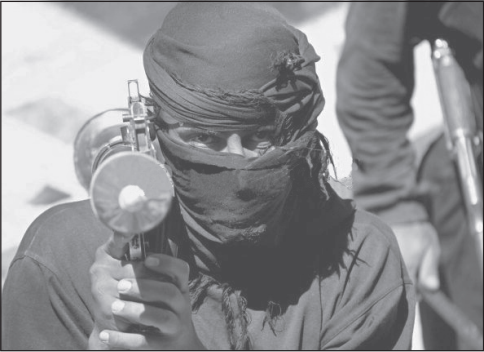
The best way to illustrate our statement is with an example, something that happened in Duluya, a small city north of Baghdad in the famous “Sunni triangle.” The Americans have faced continuous gunfire against their personnel and convoys since they occupied the city at the end of March 2003. In reaction to this, they tore down several thousand date palms that lined the roads of the region. Rumors circulated about a mysterious Ba’athist organization that was supposed to be the source of these attacks. At least this is what the Arab media reports. At the same time, the Israeli journal Ha’aretz gives a different version of who the authors of these attacks are: they are supposed to be the work of “idle young men” who were paid from $1,000 to $1,500 by some Islamist organization to carry out surprise attacks against American troops. The journal quotes one of these youths, “It’s the best way to earn a living in Iraq today.” strangely enough, at precisely the time when the occupation troops cut the date palms down, depriving dozens of agricultural workers of their means of sustenance, attacks against American military forces became even more frequent.
Will the exploited who clearly oppose every global faction of capitalism have the strength not to sink into radical Islamism or pan-Arabism? Will our brothers and sisters in Iraq have the strength not to get bogged down in a popular war for national liberation? Everything will be staked on these questions over the next few months. But the response cannot come from Iraqis alone, since they will have quite a hard time escaping the deadly embrace of one or another faction of the ruling class as long as they remain so utterly isolated. This will all depend on the relationships of force between classes on a global level, particularly in the countries from which the occupation troops come. Unfortunately, this is not in our favor, though here and there a breath of fresh air comes to us, from Bolivia, from Peru and elsewhere. The responsibility of the exploited in the USA, as well as other states that take part directly or indirectly in the occupation of Iraq, comes to press on the balance once again with all its weight. If this slaughter is to come to an end and the Iraqi proletarians become clearly autonomous from the traps of Islamism and pan-Arab nationalism, it will be necessary for the exploited of the world – and particularly of the USA, England, Poland, Spain, and Italy – to react, take action, organize and refuse to go on serving as cannon fodder, transforming this war into a social war against the masters at home.
At the moment, there is not much of interest going on from this side. However, the American proletariat is not completely caught up in a fervent patriotism condensed into the well-known slogan “support our troops” or, for the more critical, in a sheep-like crusade demanding the most blessed pacifism. In this context, and in opposition to the general environment, it is necessary to emphasize some interesting responses that happened on the west coast of the United States at the moment the war broke out, like the demonstration in San Francisco in March, 2003. A few thousand “communists and anarchists” (according to the police report) had made a date in the center of the city. After blocking the main access roads with road-construction barricades, the demonstrators clashed with police. This led to a full-fledged rebellion with dozens of direct actions at the expense of banks, multinational corporations and other places of power. At the same time, on the other side of the bay, a few thousand demonstrators occupied the university in Berkeley, where the cops arrested 1,350 people. Also on the occasion of these demonstrations some proletarians proudly displayed a banner that read: “We support our troops, when they shoot their officers.” A superb twist to the official government slogan. This overturning of meaning is welcome and indicates a direction in struggle. We must, unfortunately, note that revolutionary defeatism remains an isolated position in a pacifist bog that perfectly compliments the most unimaginative third-worldism.
Even among the associations of soldiers’ relatives, at the forefront of the struggle against the war in Iraq, most people placed their hopes on the election of a Democratic presidential team to “bring our boys home,” rather than counting on direct action against the army. Few in the US military renounce their roles as mercenaries, despite the contradiction between the soldiers’ training and the prosaic reality of being nothing more than cops sent around the world to repress other exploited people. The fact that there are thirty deserters at this point is not what will tip the scale in our favor. After all, during the Vietnam War there were officially more than 200,000! As courageous as marine corporal Stephen Funk’s anti-war declarations are in the climate of jingoist hysteria that has reigned in the United States since September 11, 2001, his refusal to continue killing civilians after twenty years of service and his declaration of conscientious objection will not make the catastrophic situation of submission in which the American proletariat exists today change to any great extent. The same can be said for the other nation-states that presently encounter little concrete opposition to sending troops to Iraq.
But we can be sure of this: the bloody occupation of Iraq is not over. American and allied troops will have to stay there for a long time. This quagmire begins to remind us of Vietnam. It will certainly force the Pentagon to send more and more troops to confront the growing number of attacks. As Donald Rumsfeld admitted in a memorandum to the US Congress on October 16, 2004, “We lack the means for measuring whether we are winning or losing the global battle against terrorism. My impression is that up to now we have not made any truly decisive progress.”
The latest figures we have speak of more than five hundred American deaths since the start of the conflict.[5] This does not count those sent on secret missions and those buried without notice in the desert – recently a number of graves have been uncovered. At this point the number of American wounded has surpassed 10,000, despite the armor that most of the soldiers wear and the immediate care for the wounded by a specialized team. This means more than ten wounded a day, most of them in serious condition. As the American neo-conservative journal The New Republic reported: “… the media have always treated the number of deaths in combat as the most dependable measure of progress made on the battlefield, but it is the number of wounded that reveals the situation on the terrain.”
The American army has not had to deal with such a large number of wounded soldiers since Vietnam. They are returned to the United States on cargo planes, preferably at night in order to avoid television cameras and the demoralization of the troops who remain at home. Suicides among enlisted troops have now reached thirteen, and 478 soldiers have been sent back home for “mental health problems” as of September 25, 2003. Furthermore, the number of attacks carried out daily against the troops of order is close to thirty, and most of the troops have been there for more than a year. The conflict is turning out to be long, and this displeases the enlisted men and women who “no longer understand why they are there.” If we add the inability of the Pentagon to replace these troops due to a lack of manpower, we have a cocktail that is becoming increasingly explosive for the power that wants to confirm itself as the undisputed global police.
Should we see the warning signs of a possible breach in national unity in all this, a breach like the one that provoked a huge crack in the very heart of American society forty years ago during the Vietnam War? At the time, the only way for a soldier to avoid being horribly wounded or killed was by opposing his involvement in the war by any means possible. And such means, elementary in their simplicity, consisted first of all in avoiding every conflict with the enemy. Through the practice of fragging (literally, “fragmenting the officers”!), which consisted in launching grenades against officers, soldiers who opposed the war caused very real terror among their superiors who progressively lost control of their troops. In 1970, the Pentagon reported 65,643 deserters, which is equivalent to four infantry divisions. Another interesting figure: soldiers directly published more than three hundred underground papers against the war that greatly contributed to breaking the isolation while at the same time generalizing opposition to the war. With daily demonstrations in the USA, sabotage, strikes and occupations that concretely hindered the continuation of the war, the American government had to end its engagement in Vietnam in the early 1970s and gradually withdrew its troops. By recalling some of these significant events of the nightmare the ruling class experienced during that time, we can not only measure the huge chasm that now separates us from that period of struggle; we can also point out the only way to bring the current butchery to an end.
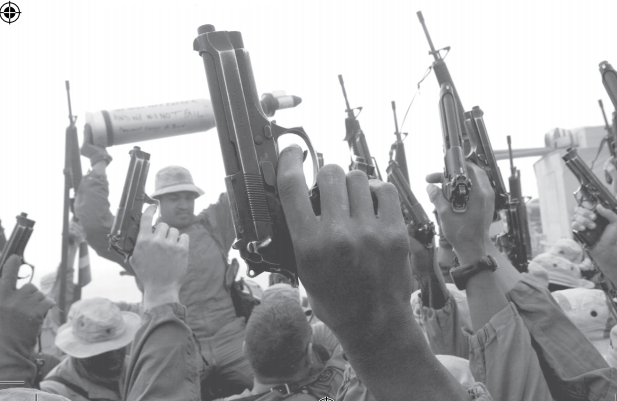
Did You Say Cannon Fodder?
Contrary to what happened in Vietnam, the American army operating today in Iraq is a professional army composed of soldiers who have “chosen” to fight. This is a completely relative choice, since for most of those who have enlisted, it is a direct consequence of their social condition. Those who recruit cannon fodder have always known that an impoverished individual without prospects will be more inclined to accept the benefits that the fatherland offers to those who serve its military. A wage, a piece of land, a university scholarship, a residence permit, or a handful of dollars: the possibilities for co-opting the poor into the defense of the nation are nearly endless.
In fact, the Pentagon explicitly aims its recruitment propaganda at the most exploited and dispossessed and uses the full force of advertising techniques to draw in the desperate. Promises of job training and benefits combine with images of power in which the protagonists are proud and determined young people of all colors, presenting the impression that the military can offer the dignity missing from the lives of the poor. In addition, the Pentagon targets specific ethnic and racial groups among the exploited with more pointed publicity. An example that exposes the kinds of methods used can be found in the recruiting campaigns aimed at poor Latin American immigrants within the US.
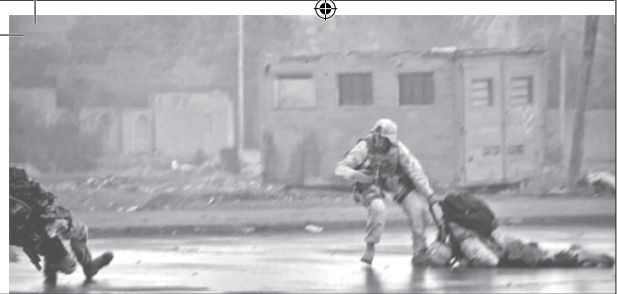
Many Latin American immigrants are of combat age and live in poor, often desperate, conditions. Their position in US society is usually quite precarious, particularly if they lack papers. This leaves them particularly vulnerable to the extortion and promises of military recruiters. So the Pentagon has specifically promised “green cards” to all undocumented immigrants who enlist, as well as expedited citizenship. Poverty combined with the desire to lessen the precariousness of their existence has thus led 37,000 Latinos to join the military.
But this is just one example of the way in which the Pentagon plays on the needs of specific groups among the exploited in order to get “volunteers” to act as cannon fodder for their various operations and particularly for the current war. Similar tactics are used among all the poor, anyone vulnerable to the extortions imposed by a precarious existence. Desperation provides the military with the sort of cannon fodder they prefer: those who might cause trouble and even choose to fight for themselves if they remained at home.
The recruitment programs are still not providing enough cannon fodder for the current war. The military needs an endless supply of human resources to feed its projects of domination. So US recruitment sergeants have even been crossing the Mexican border in search of young people who have dropped out of school and are trying to obtain documents and residence in the United States. The generals consider the desire of many Mexican proletarians to obtain American citizenship to be “decidedly positive” and thus don’t hesitate to recruit them in exchange for the promise of a brand new ID card.
The military experts call this strategy of aimed enlistment “Poverty recruitment.” This strategy is in effect wherever there is a concentration of particularly poor proletarians, within the United states and beyond its borders. In the United States, the dogs of war start their recruitment work in the elementary schools and extol the advantages of military life throughout the course of study, obviously including the university. This has led to the birth of several associations of resistance to this practice. The American Movement Against Recruitment is in its fifth strike against enlistment and the war, and the organization Students Not Soldiers has launched a campaign against the army’s presence in schools. In Mexico, this resistance movement has assumed more concrete dimensions. In Tijuana, American recruiters from San Diego, supported by a few Mexican accomplices who spread publicity for enlistment in the US army, have been repeatedly thrown out of schools with kicks in the ass. An example to follow!
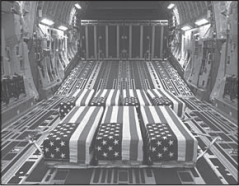
The Social Storm Between the Tigris and Euphrates
In many ways the conditions today are quite different than in 1991, but now like then, the Coalition forces are facing the realization of their worst nightmare in Iraq. The current resistance is shattering all their projects of pacification. More than a year since the capture of Baghdad, continuous attacks, acts of sabotage, arson of oil pipelines and plants, ambushes and kidnappings at the expense of the men recruited for security (a true private army of about 15,000 mercenaries, with a turnover of tens of billions of dollars) certainly don’t provide the best terrain for the affairs of multinationals. Before packing his bags to leave, a director of a multinational oil company declared, “security, the first prerequisite for reconstruction and investment, is lacking.” This statement expresses the common concerns of the various jackals that came around after the bombings to plunder the resources of a population already reduced to misery by a decade of UN-sanctioned embargo. Several multinationals have thus been forced to abandon Iraq, leaving behind the corpses of a few of their mercenaries. For example, KBR, a Halliburton affiliate, stated that thirty percent of its personnel had been killed.
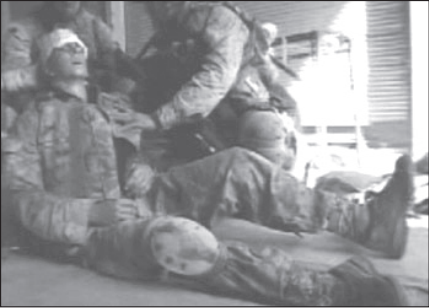
Another nightmare that has kept the United states and its allies from sleeping peacefully is that of seeing their “boys” return to the fatherland in black body bags. More than eight hundred American soldiers have been killed since the start of the war. More than one hundred died in the month of April 2004, following the breakout of the so-called Shiite revolt. Furthermore, there is a strong presence of proletarians and immigrants among the troops based in Iraq who didn’t enlist due to patriotic convictions, but rather due to economic difficulties. If we exclude the fanatics that we imagine are not lacking in the US army, these troops are not properly enthusiastic about croaking like flies on the dusty streets of Fallujah or in the suburbs of Baghdad, where they don’t even know what they were sent to do. Dozens of soldiers commit suicide, many desert, while others are filled daily with drugs and psychopharmaceuticals. So if the morale of the troops is not very high (and this seems to be the case), and if the “internal front” is also starting to groan in the face of the returning coffins and the economic sacrifices that prolonging the war requires, then the US administration actually has something to worry about.
In addition to this, over the past few decades, the United States has used a policy of using local partisanship to spare its own men and to cause others to carry out slaughter among themselves for its interests in international operations. This policy doesn’t seem to be so reliable, as illustrious past examples, from bin Laden to Saddam Hussein, have already shown. Now, in the current social agitation, there are signs of emerging alliances – temporary and not yet generalized – between Shiites, Sunnis and Kurds in the guerrilla struggle against the occupiers, signs that would precisely begin to thwart the project of “balkanization” of the region and “ethnicization” of the conflict. The forces that create the specter of a civil war, in which Shiites, Sunnis, Kurds and Turkmen would oppose each other in an ethno-religious conflict, are the same forces that use it as an argument to justify their presence in Iraq, as if to say: “If we were to abandon the country, the Iraqis would slaughter each other.” Unfortunately for the occupiers, not only has there never in history been any ethnic war between Shiites and Sunnis or Kurds, but the Iraqis today are showing a solid unity against attempts to divide them. For example, when the US attributed the slaughter of Shiites to Al Qaeda, the group denied all responsibility and directly accused the occupiers. Furthermore, following these attacks, the solidarity from Sunnis and from all Iraqis has been strong. They marched in demonstrations with the slogan: “Down with America, down with terrorism!” The widespread perception was that the American presence caused these slaughters of civilians and that the US was the main inspirer of these efforts to spark division and fratricidal civil war.
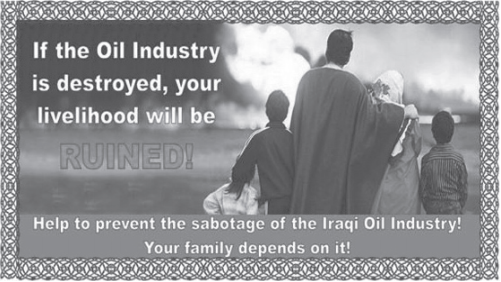
Another bit of news is indicative of the difficulties that the Western Coalition is facing at this time: the appointment of Jassim Mohammed Saleh as the head of the troops commissioned to restore order in Fallujah, epicenter of the so-called Shiite revolt that has been spreading throughout Iraq since April 2004. Moqtada Al Sadr, who the US wants to take “dead or alive” as the supposed leader and inspirer of the uprising, has barricaded himself in this city. Saleh is a general from Saddam’s former regime, a veteran of the Republican Guard who was active during the repression of the generalized insurrection following the first Gulf war. this episode reveals how democracy and dictatorship, with their respective functionaries, are not, in fact, in substantial opposition. In the face of the proletarian threat, the ruling class doesn’t hesitate to close ranks in order to suppress that which could endanger their common reason for being: the social organization based on domination and exploitation. So the fact that Saleh was judged unreliable and fired within a few days shows to what extent the explosion following the invasion is even more profound and ungovernable than that of 1991. If Bush senior delegated the extermination of the insurgents to Saddam Hussein, now bush junior can no longer trust anyone and is forced to act on his own.
An indispensable premise for any discussion of the social conflict blazing in postwar Iraq, is admitting the difficulty in finding information that is not a mere echo of the Coalition propaganda. In this era of real-time information, of the omnipresence of images, of the internet, of satellites and of digital technology, we are dispossessed of the capacity to communicate in a non-mediated way as never before. We are more and more dependent on the press releases of the general staff and of the “embedded” reporters. But what clearly emerges from between the lines of the propaganda, even at a superficial look, is the complexity that characterizes the movement opposing the Western occupation. In fact, we don’t catch a glimpse of any political or military leadership in a position to “represent” or monopolize the entire resistance. Sources near the United States speak of a faceless resistance due to the impossibility of finding a leader or recognizable representative.
In the first few months following the invasion, American propaganda tried to attribute the instigation of armed actions almost exclusively to the residual forces of the Ba’athist party. Later, it spoke of the presence of groups linked to Al Qaeda, infiltrating the country in order to bring the strategy of “international terrorism.”
Today, as the uprising spreads, it becomes impossible to hide that reality is clearly more varied. Some numbers express this well: in December 2003, of 12,000 suspects arrested by the United States in Iraq, fewer than five hundred were foreigners,[6] of these only twenty-five were suspected of links with Al Qaeda, and the most suspicion fell on a mere five people.
Sidebar: Strike!
The Iraqi resistance to the Coalition military operation hasn’t just manifested itself through guerrilla activity. Along with the armed attacks, there are other manifestations of protest, for example, the agitation that has broken out in many work sectors. Unfortunately, there is not a lot of information about these struggles, due to the scarcity of news that has managed to escape Iraq during the war.
But a little bit has filtered out. It is known that in January 2004, workers from the oil industry in Bassora rejected the decree of the provisional authority that fixed their wages. The workers threatened to “blockade Iraq.” First they threatened a total strike and then threatened to come together in armed resistance. Their threats forced the provisional authority to return to the negotiation table and raise their wages.
Moved by their example, workers of the electrical industry in Najibeeya, Haartha and Az Zubeir also decided to go into struggle, carrying out a wildcat strike during which they took the company’s administrative building by assault, declaring the decree of the provisional authority to no longer be valid and threatening to blockade everything if their wage demands were not accepted. In this case as well, the provisional authority was forced to come to terms with the workers’ demands.
But the collapse of the value of Iraqi money has transformed all these wage concessions into mere lies. Thus, the situation still remains quite volatile. Even many government employees have gone on strike, refusing to do their work for the governing Council, which the Coalition forces uphold.
The statements of Iraqi witnesses, both guerrillas and mere “civilians,” also confirm this. They describe an extremely diversified archipelago in which profoundly different groups, practices and motivations take part, and where alliances that are mainly tactical and contingent on autonomous action are perpetually changing. From a class point of view, the most interesting piece of information that emerges is the generalized climate of rage against the occupiers that provides the background for the activity of specific groups and factions. This rage is growing in the face of the disastrous conditions to which the occupying forces have reduced the country. Alongside the more organized groups, there is a huge number of dissatisfied proletarians who are neither fanatic Islamists nor nostalgic for Saddam’s dictatorship. Rather, they are mainly unemployed people, who have undergone a decade of deprivation and don’t see any prospects for improvement, as promised by their “liberators.” among them are thousands of peasants thrown suddenly into the insecurity of the free market, plundered even of the little that was guaranteed by the planned economy of the previous regime, the groups of soldiers deprived of a wage that represented a minimal security in the reigning unemployment, as well as the thousands of unemployed people on the outskirts of the big cities – these damned of the Earth, in every corner of the planet, who capitalist society condemns to perpetual existence as an undesirable excess. Alongside and often among them, there is the ensemble of those who are thrown into the struggle by simple hatred brought on by the often indiscriminate violence of the occupying forces.
The example of Samarra is not at all exceptional, which is why it is worthwhile to briefly describe it as paradigmatic of the spreading mechanisms. In this village north of Baghdad, which was not a Ba’ath fief even though it was located in the so-called Sunni triangle, the most violent conflict started following a wedding feast. the gunshots of joy were transformed into a confused exchange of bullets that left at least four dead on the ground. There were immediate conflicts at local checkpoints, and a growing number of people went out to attack the Americans in order to avenge the killing of a family. The soldiers were forced to withdraw from two of three outposts that they held in the city. A few days later, a transport of banknotes escorted by occupation troops – that mobilized eight armored cars, four armor-plated vehicles, six jeeps and 93 men – was attacked. The conflict was devastating, with more than fifty deaths among the rebels and a dozen on the other side. It seemed like a decisive blow inflicted on the insurgents. But in the following weeks attacks would intensify, along with ransackings and reprisals against civilians “close” to the guerrillas, in a self-feeding spiral.
In the face of a generalized climate of hostility that is quickly becoming an armed rebellion, the occupying Coalition is trying to find some leader to which to refer, and they seem to have found it in Moqtada Al Sadr.
The rise of this young radical Islamist and his “Madhi army” is exemplary with regard to the artifices of his achievements, both real and media-invented. His followers are mostly poor and unemployed young people from the outskirts of Baghdad, in particular from Sadr City. After the collapse of the monarchy, Sadr City, formerly Al Tawra (the revolution), was supposed to be the model neighborhood inspired by Manhattan where thousands of homeless people would find a home. But its population quickly increased by many times, and it changed into one of the many desperate shantytowns that fill the world. Here Al Sadr plays a role of assistance and indoctrination. The great wealth inherited from his father through Shiite charitable organizations allows him to do this. These organizations reinvest the contributions of the Shiite faithful into Koranic schools, local emergency clinics, welfare for the poor and neighborhood administration. This network of organizations is very similar to the one established in Palestine by the Lebanese Shiite party Amal, Hezbollah and Hamas. Al Sadr’s forces carry out a role similar to that of the Iranian pasdaran in the neighborhoods. With one eye on Islamism and one eye on the pocketbook, they attack cinemas, video stores and liquor stores when these businesses don’t pay protection money to the mosques. But beyond this, they take on the burden of safeguarding order, even assuming the task of urban watch or street-sweeper. They guarantee basic services, from trash collection to gas cylinders, from the management of first aid stations to the control of hospitals. Often the conflicts that are described to us as struggles between moderates and radicals are nothing more than feuds for the control of whatever eight people per thousand that allow the various foundations of ayatollahs to have a presence and control in the territory. During the wave of looting that followed the Western invasion, members of Al Sadr’s militia were cutting off the looters and commandeering their well-gotten goods: “Private property is a divine right and should not be touched. Let’s restore them [the sequestered goods] to the rightful owners, if they are still alive. Otherwise, let’s redistribute them to the needy.”
Moqtada Al Sadr’s army is, thus, a mafia that brings together religious intransigence, economic power and a good dose of paternalism. It is not at all surprising – especially after the manhunt that the USA unleashed against Al Sadr – that many proletarians have rallied to his defense, convinced that this is where they can find the only opposition to yankee aggression that is radical and well-organized at the same time.
A chronology, or even just a panoramic view, of Iraqi resistance would be enormous. It is enough to consider that according to the mass media, there are thirty-five attacks against the occupation troops every day, and these attacks are each extremely different from the others.
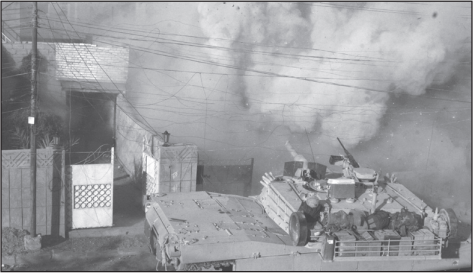
Almost all the American military sources have tardily admitted what was clear to everyone: a guerrilla struggle of such range and widespread distribution could not take place without consistent popular support. Earlier, the American army spoke only of a handful of Ba’athists or terrorists. Then directly after Saddam’s capture, it spoke of a headless – beheaded – resistance whose days were numbered. But now the awareness of facing a genuine guerrilla war has led it to adopt the classical tactics of counterinsurgency on a large scale. This anticipates the abandonment of a defensive line, and the taking of initiative by the occupiers with a continuous and preventative offensive against the resistance.
Up until June 2003, the principle use of the 125,000 or so American soldiers consisted of protection of the bases. General Abizaid’s assumption of command, replacing General Franks, also corresponded to the change of strategy imposed by a classic guerrilla-type campaign, that led to “attacking them, maintaining the offensive, dismantling their cells, killing whoever tries to kill and being very aggressive,” as Abizaid himself declared. In an escalation of tests of strength and exhibitions of their firepower for destroying and demoralizing the enemy, Coalition forces began Operation Iron Hammer in November 2003, with artillery bombings and air attacks (in a single week, 12,000 patrols, 230 targeted raids, 1200 prisoners, 50 combatants killed).
If this strategy has led to an immediate drop in the number of attacks and of American victims, in the course of the escalation, there has been a more than predictable parallel reorganization of the rebels. They have modified their tactics in relation to those of the enemy.
Thus, if the rebels limited themselves to shooting from a distance and running away at first, from that time on they began to take up the conflict using portable grenade launchers and placing mines – rudimentary at first and more effective later – finally reaching the point of habitually using mortars and rockets to strike bases from a distance and bring down helicopters. There were no longer just Delta Kiowa Warriors and Black Hawks in the rebels’ sights, but also Apache attack helicopters and C-5s, the largest means of air transport in the world. The streets have become like traps for the occupiers. When they are forced to move, they go at the highest speed, generally in the middle of the street, blocking civilian traffic. In the meantime, bulldozers have uprooted the vegetation alongside the main transportation arteries, in the desperate attempt to make them safer.
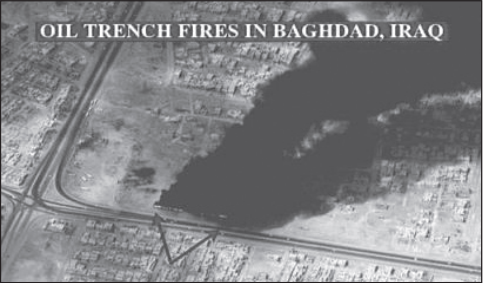
Blow for blow, the assault and precision rifles, light and heavy machine guns, anti-tank rocket launchers, mortars, cannons, artillery rockets and various anti-tank and antipersonnel mines don’t spare Iraqi collaborationists and police, who are now so hated by the population that they have to operate with covered faces.
As an inevitable secondary effect, the anti-guerrilla strategy of the occupiers has also produced a total collapse of the tiny bit of consent and hope in the “liberators” that the population retained. The forces of the Coalition have surrounded “suspect” villages with barbed wire, demolished the houses of guerrillas and arrested their relatives and carried out the sort of pointed homicides that the Israeli army made famous.[7] In fact, many of the specialists and advisers of the US army directly active in Iraq are Israelis. This déjà vu points with precision at what is being prepared for the Iraqi exploited and what the US administration means when it speaks of “exporting democracy” to the Middle East: the construction of a concentration camp for an entire population. This gives the resistance, even despite itself, the additional task of being an outpost of opposition to the concentration camp plan for the Middle East. And the Iraqi rebels seem to have the intention and sufficient arms to hold out for a long time, while the United states no longer has men to deploy in Iraq since it cannot leave itself exposed in other parts of the world nor send all the reserves (in these times, one never knows what might happen, even in the fatherland) to the place. If it is true – as the US administration itself has made clear – that Iraq was supposed to have been merely the first Middle Eastern pawn, the Iraqi insurgents are certainly putting the strongest imperialist power on the planet and its plans into check.
The slogan of young Algerian insurgents in Kabylia in 2001, “You cannot kill us, we’re already dead!”, clearly expressed that mixture of lucidity and desperation that now characterizes every revolt of the damned of the present time, and against which any army whatsoever can only be caught off-guard. Nothing can stop those who have nothing to lose. In isolation, even the most ample struggles can be short-circuited, prey to rackets of every kind. Only by spreading will the fire that is burning Mesopotamia be able to develop clearly as what it already is, a class war. And this depends on its Western accomplices.
Recommended Reading
Iraq: A Century of War and Rebellion
Practical history website
www.geocities.com/Capitolhill/senate/7672
Pamphlet available from Firestarter Press
P.O. box 50217, baltimore, Md 21211
The Class Struggle in Iraq: An Interview with a Veteran
(Practical history website)
Ten Days that Shook Iraq
About the 1991 uprising.
(Practical history website and Firestarter Press.
The Firestarter pamphlet includes the above interview.)
Eyewitness in Halabja
About events leading up to the 1988 massacre.
(Practical history website)
Do You Remember the First Time?
About international resistance to the first Gulf War.
(Practical history website)
War Damages Health – and the Health Service
About the health effects of the first Gulf War.
(Practical history website)
The Kurdish Uprising & Kurdistan’s Nationalist Shop Front and Its Negotiations With the Ba’athist/Fascist Regime
Also includes an account of the shoras, or workers’ councils, set up during the 1991 uprising.
(Firestarter Press)
[1] Except for “Did You Say Cannon Fodder?” This is a reworking of a piece from Fuoco alle Polveri that I felt needed some refinement to more accurately reflect the workings of US military recruitment.
[2] Such a farce that about 250,000 of the voters are Iraqi-Americans currently living in the United States.
[3] Contrary to the official image portrayed in the US media, this revolution was not originally an Islamist revolution, but a popular uprising. The radical Islamic movement, in fact, played the role of restoring order. —Translator
[4] At which point Bush declared the war over... —Translator
[5] This text was originally written in February 2004. The latest figure I saw (for the first week of January 2005) tallies more than 1300 American deaths. —Translator
[6] A recent New York times news story indicates an even lower figure, reporting that after the December 2004 attack on Fallujah, the number of non-Iraqis arrested on suspicion of participation in insurgent activity had risen from around 140 to a bit over 300. —Translator
[7] Israeli military advisers have a played a major role in formulating Coalition policy for dealing with “insurgent” villages in Iraq. Not surprisingly, they have devised the same method for Iraq that the Israeli army uses in Palestine. —Translator